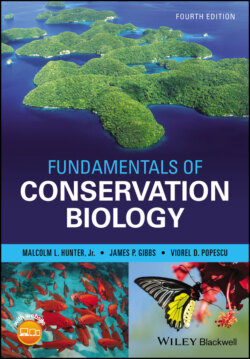Читать книгу Fundamentals of Conservation Biology - Malcolm L. Hunter Jr. - Страница 80
Scientific and Educational Values
ОглавлениеEcology has become a very sophisticated science, but we still cannot hope to understand an ecosystem fully. This dilemma is apparent when you think of ecology as the apex of a pyramid with biology as the next layer below, earth sciences such as geology and climatology forming the third layer, chemistry the fourth, and physics the foundation. Of course, ecologists do not need an intimate familiarity with quantum physics to be effective, but they do need a basic understanding of thermodynamics, electromagnetic radiation, and many other aspects of physics. In contrast, a physicist can be highly successful and understand nothing about ecology. The fact that ecosystems integrate so many phenomena makes them a focal point for scientists trying to monitor how the Earth is changing, particularly in response to human activities. This feature also means that ecosystems are fascinating models for researchers interested in complex systems, for example by modeling how carbon moves through ecosystems to better predict global climate change (Harris et al. 2014).
Ecosystems are also wonderful models for showing children and adults how everything in the environment can be connected to everything else. Drawing lines between boxes to represent the functional relationships of those boxes can become an extremely complex exercise. Alternatively, it can be as simple as drawing lines between the sun, a plant, and an animal to form a food chain and then adding more boxes and lines to create a food web. How did that cup of coffee you are drinking get into your hands? In short, we can all learn a great deal from ecosystems.
